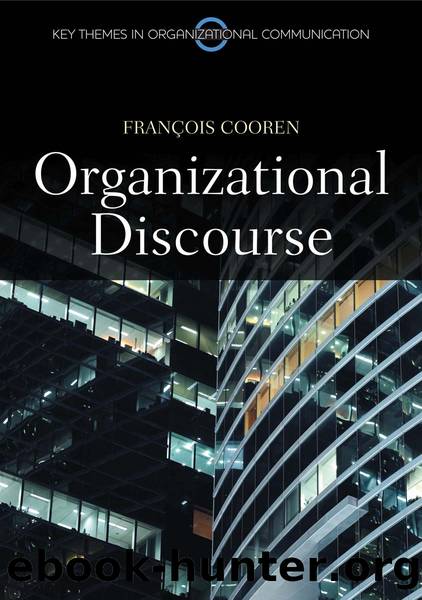Organizational Discourse by François Cooren

Author:François Cooren [Cooren, François]
Language: eng
Format: epub
ISBN: 9780745689418
Published: 2014-10-06T18:05:00+00:00
Unfolding Organizational Cultures from Discourse
As I said earlier, some identities do not have to be cultivated in order to exist, but most of the time they are and this is why we can recognize them in a series of texts or conversations. If, for instance, solidarity and equity are key cultural traits for self-management teams, it means that they will, by definition, be cultivated through not only what their members say and do, but also the texts and documents they will promote or mobilize, or even the artifacts, objects, and decorations they will display.
As semiotics reminds us, all these things, texts and conversations will say or convey something about what is cultivated in a given group, team, or organization. We thus have to take seriously what the term “value” means, since a value means, by definition, something that people regard highly, cherish, or protect. In the case of the self-managing team, we saw that something like solidarity or equity could qualify as a specific value because speaking repeatedly on its behalf means that you are, by definition, attached to or preoccupied with it.
Indeed, if you keep implicitly (or even sometimes explicitly) defending values like solidarity and equity, it means that you are attached to them, an attachment that enjoins or leads you to cultivate them in your conversations. What a discursive perspective on organization allows us to unveil is the performative character of things like values, norms, and principles, which define what a culture is. Interestingly, this echoes what Van Maanen (2011) says when he notices that:
Culture simply refers to the meanings and practices produced, sustained, and altered through interaction, and ethnography is the study and representation of culture as used by particular people, in particular places, at particular times. More important perhaps is not what culture is (and the semantic elasticity surrounding the concept), but – and in keeping with pragmatic principles – what culture does.” (p. 221; my italics)
As we see in this very nice quote, Van Maanen not only confirms this idea of cultivation (adding the idea of alteration, which marks the evolving character of any culture, given the performative and eventful character of its production for another next first time), but also reminds us that culture does things. How can it do something? Precisely, as we will see, through what leads people to say what they say or do what they do, that is, the values, principles, and norms that they are attached to, which a discursive perspective can allow us to unveil and unfold.
Rhetorically speaking, we could also notice the activity of identification, which is taking place in this interaction, a key notion that has clear links with the questions of (organizational) culture, identity, and, as we will see, ideology (Barker, 1993; Chaput et al., 2011; Cheney, 1983, 1991, 1997, 1999; Tompkins and Cheney, 1985). As Kenneth Burke (1969), the famous rhetorician, noticed in his Rhetoric of Motives, identification constitutes a key aspect of our lives, since it is the means by which we can,
Download
This site does not store any files on its server. We only index and link to content provided by other sites. Please contact the content providers to delete copyright contents if any and email us, we'll remove relevant links or contents immediately.
Cecilia; Or, Memoirs of an Heiress — Volume 1 by Fanny Burney(31333)
Cecilia; Or, Memoirs of an Heiress — Volume 3 by Fanny Burney(30934)
Cecilia; Or, Memoirs of an Heiress — Volume 2 by Fanny Burney(30889)
The Great Music City by Andrea Baker(21323)
We're Going to Need More Wine by Gabrielle Union(18074)
Bombshells: Glamour Girls of a Lifetime by Sullivan Steve(13109)
Pimp by Iceberg Slim(12933)
All the Missing Girls by Megan Miranda(12753)
Fifty Shades Freed by E L James(12451)
Norse Mythology by Gaiman Neil(11885)
Talking to Strangers by Malcolm Gladwell(11880)
Crazy Rich Asians by Kevin Kwan(8351)
Mindhunter: Inside the FBI's Elite Serial Crime Unit by John E. Douglas & Mark Olshaker(7835)
The Lost Art of Listening by Michael P. Nichols(6474)
Enlightenment Now: The Case for Reason, Science, Humanism, and Progress by Steven Pinker(6407)
Bad Blood by John Carreyrou(5770)
The Four Agreements by Don Miguel Ruiz(5511)
Weapons of Math Destruction by Cathy O'Neil(5038)
We Need to Talk by Celeste Headlee(4871)
